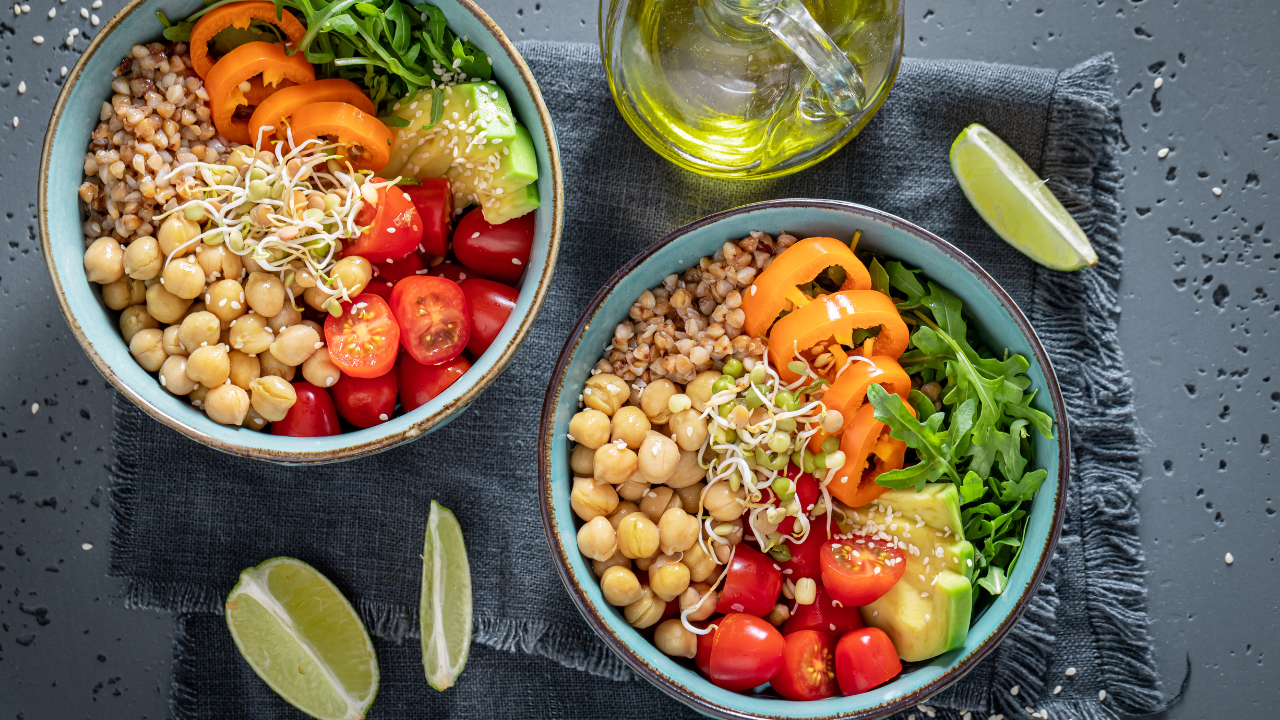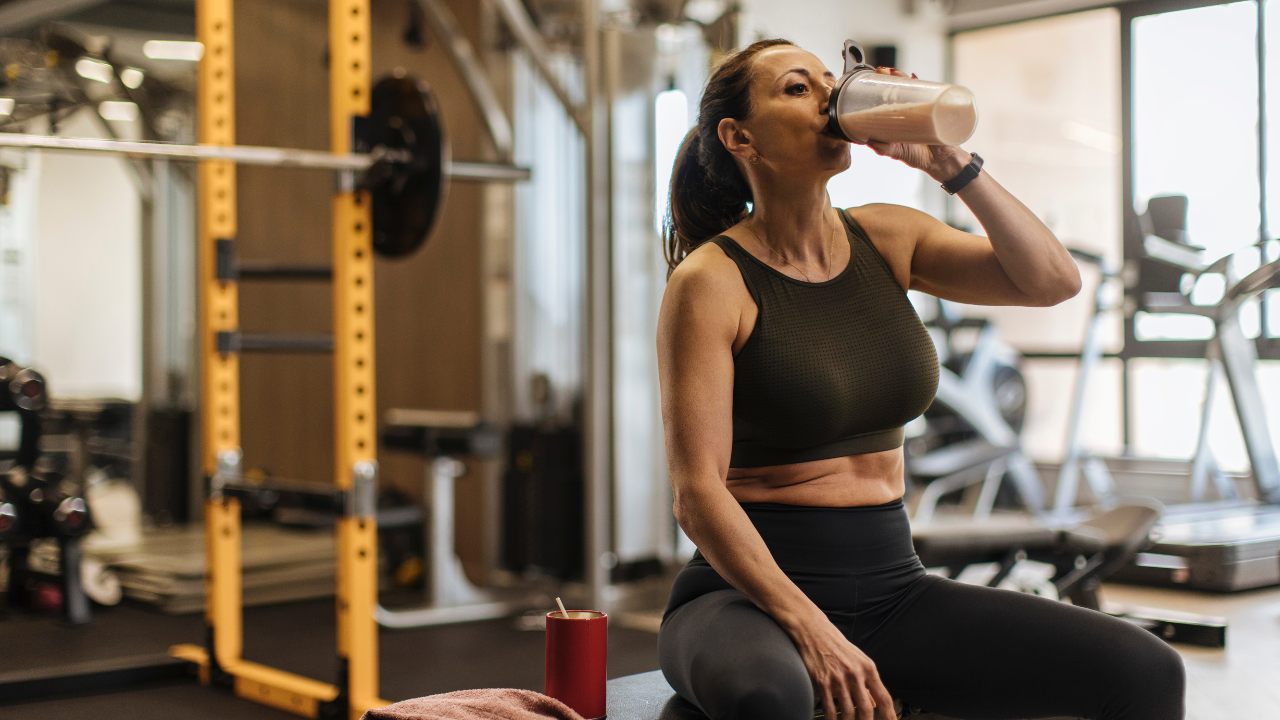Should You Be Taking a Collagen Supplement?
DISCLAIMER: Links included in this blog might be affiliate links. Health with Hannah, LLC is a participant in the Amazon Services LLC Associates Program along with other affiliate programs. If you purchase a product or service with the links that I provide I may receive a small commission with no additional charge to you. Thank you for your support!
Collagen supplements are currently very popular. They are claimed to help prevent aging, improve joint health, build muscle mass, and more.
These days you can find collagen hot chocolate, collagen body wash and creams, collagen brownies, and flavored collagens to add to your water. Jennifer Aniston has even become a spokesperson for Vital Proteins, a popular collagen brand. But what even is collagen? What is all the hype about?
If you’re new here, hello and welcome! My name is Hannah and I am a non-diet dietitian here to help you improve your relationship with your food and finally find food freedom. As a non-diet dietitian, I frequently get asked about taking supplements such as collagen.
In this blog we will cover:
What is collagen?
What are collagen supplements?
Why are collagen supplements popular?
What happens when you take a collagen supplement?
Third party tested collagen supplements
Are collagen supplements vegan?
Best food sources of collagen
How to increase collagen production
What is collagen?
Collagen is a structural protein found in the skin, bones, ligaments, and tendons of humans and animals. Collagen is the most abundant protein found in the human body.
Types of collagen
There are 28 different types of collagen in the human body that all play different roles. A large majority of the collagen consists of type I, type II, and type III.
Type I: found in connective tissue (skin, bones, tendons, etc.)
Type II: found in cartilage (ears and nose, joints between bones, etc.)
Type III: found alongside type I in smaller amounts. Also found in organs that must withstand stretching, such as the bowels and uterus.
Collagen structure
Collagen is made up of amino acids, which are the building blocks for protein. We can get these collagen building-blocks from food. When we eat protein of any type, it is broken down into amino acids, which are used by the body for whatever is needed.
The triple helix collagen strands are made up of 19 different amino acids, nearly half coming from glycine, proline, and hydroxyproline. Hydroxyproline is an amino acid that is unique to collagen aside from very small amounts in elastin, which is another protein found in our body.
It’s important to note that there is no way to control how the proteins we eat are used in the body. So when you eat a source of protein, your body may or may not use those amino acids to make collagen. It just depends on what your body’s priorities are at that time!
What are collagen supplements?
Collagen supplements, including powders and capsules, are claimed to provide various health benefits, including improved skin, better joint health, bone health, and would healing.
Where does collagen come from?
Most collagen supplements are sourced from cows, fish, and chickens. Bovine collagen supplements, which come from cows, are the most popular and consist of collagen types I and III.
What are the different types of collagen powders?
You may have seen different types of collagen powders at the health store or online, including collagen peptides, hydrolyzed collagen, collagen hydrolysate, and hydrolyzed collagen peptides. What is the difference between them?
These phrases all mean the same thing and there is no difference among them in terms of collagen processing. Collagen supplement manufacturers break down full length collagen strands into peptides through a process called hydrolysis, which is where the various names come from.
These hydrolyzed collagen peptides are generally more bioavailable, meaning they are readily and easily absorbed by your body.
Why are collagen supplements popular?
Collagen supplements are popular for various reasons, including a variety of health claims. And, well, because wellness culture loves to pick new supplements to glorify from time to time. But I’ll spare you my rant on that this time.
Will collagen improve skin health?
Some state that collagen, especially types I and III, can help decrease the presence of aging skin. Here’s my question - what is so bad about aging? Why are we always trying to prevent looking like we are getting older? Isn’t this just a normal part of being a human?
Diet culture and wellness culture are always trying to tell us that we are more beautiful (and therefore “worthy”) when we are young, wrinkle-free, and when we meet all of the other impossible beauty standards (that are always changing, by the way).
Here is a secret that might make you feel better - it is impossible to completely level up to the ever-changing beauty standards. I know, that probably doesn’t sound like a positive thing. But think of it this way - if the beauty standards are out of reach, you don’t have to try so hard to accomplish the un-accomplishable. You can do whatever makes you feel beautiful, even if it doesn’t match what society says you should do! And it is absolutely okay to look your age. This is a much more freeing way to live, if you ask me.
Diet culture rant aside, collagen supplements may help to promote skin elasticity. Here’s another recent study. It is important to note that many of the studies testing collagen supplements are short-term, conducted on small sample sizes, and/or funded by industry players.
Will collagen improve joint health?
Collagen (mainly type II) is found in cartilage, which is an important structure of the joints between bones.
Collagen supplementation may help to reduce joint pain and improve joint motility, but joint health is so multi-factorial that it is difficult to assess if collagen supplementation is really all that helpful. Joint health is largely influenced by personal history or family history of osteoarthritis or any joint diseases and collagen supplementation may not be a very effective treatment alone for chronic joint issues.
Simply put, taking a collagen supplement likely won’t make joint health any worse, but it is not a miracle treatment either.
Will collagen help build muscle?
Building lean muscle mass is generally recommended for various aspects of physical health and wellbeing. And eating protein is one very important part of putting on some muscle. But I don’t recommend using collagen supplements as your primary protein source.
Collagen is not considered a complete protein, meaning it does not include all of the essential amino acids that our bodies need to get from food. And for optimal muscle growth, we need to consume all essential amino acids.
Collagen does provide us with some amino acids (and therefore it does feed our muscles with much-need protein), but to best case scenario muscle synthesis, I recommend eating a wide variety of protein-rich foods to ensure that you are getting all of the essential amino acids.
What happens when you take a collagen supplement?
Many people take a collagen supplement hoping that it will lead to the body producing more collagen, resulting in better skin and strong joints and bones. But it is not quite that simple.
As previously mentioned, it is nearly impossible to determine how our body will use the amino acids that we provide it. So when we consume a protein source, including a collagen supplement, the body will break it down into amino acids and use it for the various functions that are needed.
In other words, your body doesn’t really care if the amino acids come from a steak or a collagen supplement. Your body is super smart and will use the amino acids for whatever is most important at that time, whether it be wound healing, muscle repair, collagen formation, or making hormones and enzymes.
Third-party tested collagen supplements
If you do decide to take a collagen supplement, I recommend taking one that is third-party tested for safety and accuracy of ingredients. Some examples of popular third-party tested collagen powders include:
Vital Proteins Collagen Peptides
Orgain Collagen Peptides
Momentous Collagen Peptides
Can a collagen supplement replace protein powder?
While collagen supplements are a source of protein, they are not considered a “complete protein” because they do not contain all 9 essential amino acids. If you are taking a protein supplement to increase muscle mass, I recommend a complete protein powder, such as a whey protein. You can find some of my favorite, dietitian-approved protein powders here.
If you are just looking to add some extra protein to your day, a collagen supplement will do. Many people enjoy that collagen powders mix well into liquids, including hot liquids such as coffee. By consuming other protein sources throughout your day, you will be able to obtain the essential amino acids that your body needs.
Are collagen supplements vegan?
There is no such thing as a true vegan collagen supplement because collagen comes from animal connective tissue.
There are some collagen supplements on the market that are labeled as vegan, but these do not contain actual collagen. What they do include are components that may increase collagen production, such as vitamin C, zinc, and amino acids derived from plant-based sources.
Food sources of collagen
Collagen supplements are very popular and they may be helpful to increase your intake of the amino acids needed for collagen production, but you can also get these amino acids from whole food sources such as chicken, fish, eggs, and bone broth.
Remember, when you eat adequate protein overall, your body can use the amino acids for what is needed, including collagen production.
How to increase collagen production
Vitamin C is needed for collagen synthesis, so if your goal is to increase collagen production, be sure to eat foods rich in vitamin C. Some examples are citrus fruits, broccoli, and bell peppers.
While you could take a vitamin C supplement with a collagen supplement, you likely don’t need to if you are eating a variety of foods that provide vitamin C. Plus, our bodies prefer to get nutrients from food rather than supplements.
Bottom line - should you be taking a collagen supplement?
It appears that the research on collagen is in its infancy. If you do wish to try a collagen supplement, this likely would be a low-risk addition to your routine granted that you choose a third-party tested supplement.
Collagen supplements are only a small piece of the skin and joint health puzzle. Other factors such as using sunscreen, eating adequate protein, establishing a movement routine, etc. are also necessary habits to promote skin elasticity and healthy joints.
Learn more
Featured podcast episode
Want more help on your diet ditching journey?
Join my signature membership to become part of a community of ex-dieters working towards food freedom and making peace with food so they no longer need to cut out their favorite foods.




































